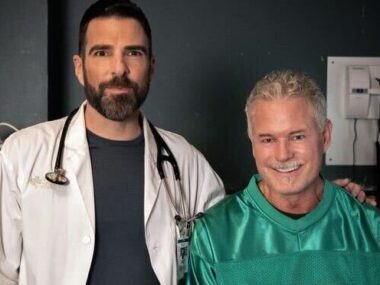Supporting those new to ALS with lessons from my experience
After years of living with the disease, I have advice to offer — and that helps me
Written by |

On the ski trail the other afternoon, I was feeling discouraged. I hadn’t slept well the previous couple of nights and had a low-grade headache, but I willed myself to keep going. Exercise is good for my body, and being in nature usually soothes my mind. They’re two of my biggest coping mechanisms in dealing with the stress of living with my husband’s ALS.
I skied my favorite path through birch trees, but the forest didn’t work its magic on me that day.
But then my phone dinged. I opened a message from a member of an ALS Facebook group. On occasion, people reach out to me because we’ve been at this for so long.
It’s been almost 13 years since Todd’s ALS diagnosis. I remember those early days when our life had derailed. Todd was 39 years old. I was 32. We had a 4-year-old and a 9-month-old. The diagnosis was devastating, and I couldn’t imagine how we’d ever be OK. It was helpful for me to talk with another spouse caregiver who’d been at this for years.
Now, I’m the veteran spouse caregiver. I feel like we’ve navigated the last decade well, considering the circumstances. Life with paralysis is hard, and it only gets harder with a progressive disease.
Over the past year, Todd has needed breathing support, and he’s since become homebound and sometimes counts the hours until bedtime. We’re often bored day to day, interrupted with occasional frenzied activity to clear his lungs. Life increasingly feels like a slog for both of us.
What could I offer this other caregiving spouse in my discouraged state? I came up with a few things that rang true, even in my funk:
- Give yourself time to process and grieve. It took both of us at least a year to come to some sort of acceptance.
- If your spouse still has functionality, take a special trip if you can. Make memories and take a lot of pictures. Team Gleason helps people with ALS fund trips.
- It’s hard to live with a disease that gets progressively worse, but there have been good moments in our years living with ALS. And for those of us who have children (or grandchildren, nieces, or nephews), we can find vicarious joy in watching our kids experience new things and grow up.
Sometimes it’s easier to find perspective for others than for oneself — and after sending my reply, I felt my spirits lift a bit.
Note: ALS News Today is strictly a news and information website about the disease. It does not provide medical advice, diagnosis, or treatment. This content is not intended to be a substitute for professional medical advice, diagnosis, or treatment. Always seek the advice of your physician or other qualified health provider with any questions you may have regarding a medical condition. Never disregard professional medical advice or delay in seeking it because of something you have read on this website. The opinions expressed in this column are not those of ALS News Today or its parent company, Bionews, and are intended to spark discussion about issues pertaining to ALS.







frankciampitti
pls forward any new information.to me this Dease is a night mare for all of us that i cant belive that so little is being done just the testing is so taxing on pals 11 neurologist.everyone had a different answer it was als the whole time this is not a rare Dease by no means everyone knows some one who has it or passed away from this monster.i would realy appreciate it i know all pals go to sleep and dream and when we wake up its still there and it gets worse over night and the night mare starts all over me im taking the leap xl l serine 2000 mgs tuca turmeric curcumin zink vitamin c d was taking riluzole made me worse
Suzanne Gallo
Nice column!